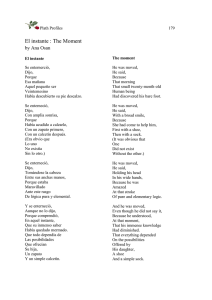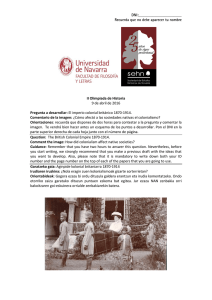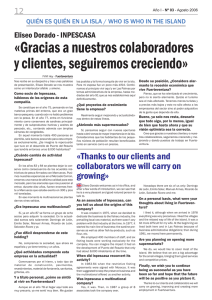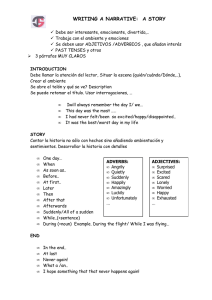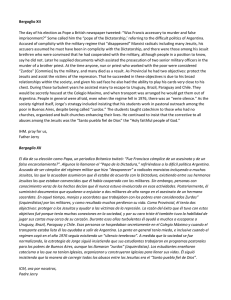“I was angry. I was not sure about who I was,” said Cordoba
Anuncio
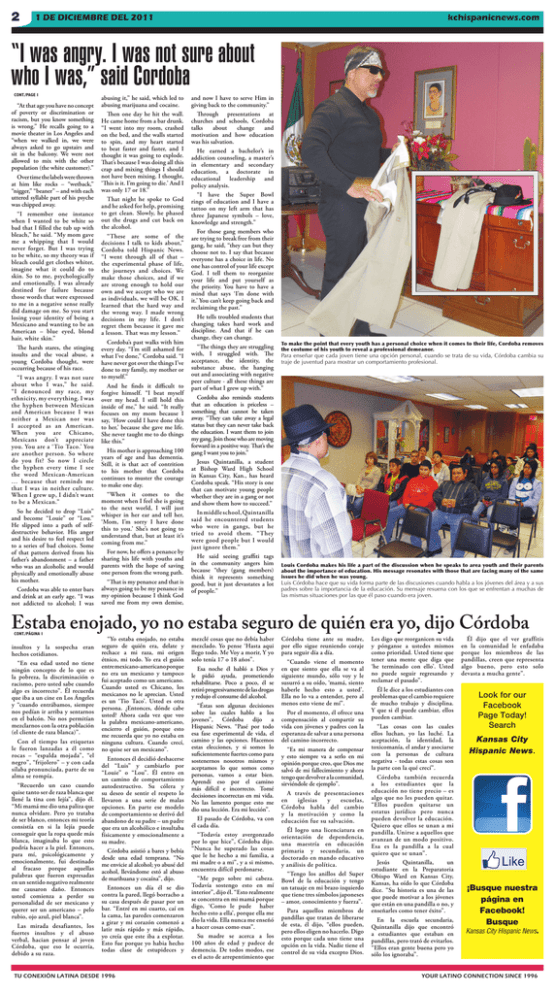
2 1 DE DICIEMBRE DEL 2011 kchispanicnews.com “I was angry. I was not sure about who I was,” said Cordoba CONT./PAGE 1 “At that age you have no concept of poverty or discrimination or racism, but you know something is wrong.” He recalls going to a movie theater in Los Angeles and “when we walked in, we were always asked to go upstairs and sit in the balcony. We were not allowed to mix with the other population (the white customer).” Over time the labels were thrown at him like rocks – “wetback,” “nigger,” “beaner” – and with each uttered syllable part of his psyche was chipped away. “I remember one instance when I wanted to be white so bad that I filled the tub up with bleach,” he said. “My mom gave me a whipping that I would never forget. But I was trying to be white, so my theory was if bleach could get clothes whiter, imagine what it could do to skin. So to me, psychologically and emotionally, I was already destined for failure because those words that were expressed to me in a negative sense really did damage on me. So you start losing your identity of being a Mexicano and wanting to be an American – blue eyed, blond hair, white skin.” The harsh stares, the stinging insults and the vocal abuse, a young Cordoba thought, were occurring because of his race. “I was angry. I was not sure about who I was,” he said. “I denounced my race, my ethnicity, my everything. I was the hyphen between Mexican and American because I was neither a Mexican nor was I accepted as an American. When you are Chicano, Mexicans don’t appreciate you. You are a ‘Tio Taco.’ You are another person. So where do you fit? So now I circle the hyphen every time I see the word Mexican-American … because that reminds me that I was in neither culture. When I grew up, I didn’t want to be a Mexican.” So he decided to drop “Luis” and become “Louie” or “Lou.” He slipped into a path of selfdestructive behavior. His anger and his desire to feel respect led to a series of bad choices. Some of that pattern derived from his father’s abandonment – a father who was an alcoholic and would physically and emotionally abuse his mother. Cordoba was able to enter bars and drink at an early age. “I was not addicted to alcohol; I was abusing it,” he said, which led to abusing marijuana and cocaine. Then one day he hit the wall. He came home from a bar drunk. “I went into my room, crashed on the bed, and the walls started to spin, and my heart started to beat faster and faster, and I thought it was going to explode. That’s because I was doing all this crap and mixing things I should not have been mixing. I thought, ‘This is it. I’m going to die.’ And I was only 17 or 18.” That night he spoke to God and he asked for help, promising to get clean. Slowly, he phased out the drugs and cut back on the alcohol. “These are some of the decisions I talk to kids about,” Cordoba told Hispanic News. “I went through all of that – the experimental phase of life, the journeys and choices. We make those choices, and if we are strong enough to hold our own and we accept who we are as individuals, we will be OK. I learned that the hard way and the wrong way. I made wrong decisions in my life. I don’t regret them because it gave me a lesson. That was my lesson.” Cordoba’s past walks with him every day. “I’m still ashamed for what I’ve done,” Cordoba said. “I have never got over the things I’ve done to my family, my mother or to myself.” And he finds it difficult to forgive himself. “I beat myself over my head. I still hold this inside of me,” he said. “It really focuses on my mom because I say, ‘How could I have done this to her,’ because she gave me life. She never taught me to do things like this.” His mother is approaching 100 years of age and has dementia. Still, it is that act of contrition to his mother that Cordoba continues to muster the courage to make one day. “When it comes to the moment when I feel she is going to the next world, I will just whisper in her ear and tell her, ‘Mom, I’m sorry I have done this to you.’ She’s not going to understand that, but at least it’s coming from me.” For now, he offers a penance by sharing his life with youths and parents with the hope of saving one person from the wrong path. “That is my penance and that is always going to be my penance in my opinion because I think God saved me from my own demise, and now I have to serve Him in giving back to the community.” Through presentations at churches and schools, Cordoba talks about change and motivation and how education was his salvation. He earned a bachelor’s in addiction counseling, a master’s in elementary and secondary education, a doctorate in educational leadership and policy analysis. “I have the Super Bowl rings of education and I have a tattoo on my left arm that has three Japanese symbols – love, knowledge and strength.” For those gang members who are trying to break free from their gang, he said, “they can but they choose not to. I say that because everyone has a choice in life. No one has control of your life except God. I tell them to reorganize your life and put yourself as the priority. You have to have a mind that says ‘I’m done with it.’ You can’t keep going back and reclaiming the past.” He tells troubled students that changing takes hard work and discipline. And that if he can change, they can change. “The things they are struggling with, I struggled with. The acceptance, the identity, the substance abuse, the hanging out and associating with negative peer culture - all these things are part of what I grew up with.” Cordoba also reminds students that an education is priceless – something that cannot be taken away. “They can take away a legal status but they can never take back the education. I want them to join my gang. Join those who are moving forward in a positive way. That’s the gang I want you to join.” Jesus Quintanilla, a student at Bishop Ward High School in Kansas City, Kan., has heard Cordoba speak. “His story is one that can motivate young people whether they are in a gang or not and show them how to succeed.” In middle school, Quintanilla said he encountered students who were in gangs, but he tried to avoid them. “They were good people but I would just ignore them.” He said seeing graffiti tags in the community angers him because “they (gang members) think it represents something good, but it just devastates a lot of people.” To make the point that every youth has a personal choice when it comes to their life, Cordoba removes the costume of his youth to reveal a professional demeanor. Para enseñar que cada joven tiene una opción personal, cuando se trata de su vida, Córdoba cambia su traje de juventud para mostrar un comportamiento profesional. Louis Cordoba makes his life a part of the discussion when he speaks to area youth and their parents about the importance of education. His message resonates with those that are facing many of the same issues he did when he was young. Luis Córdoba hace que su vida forma parte de las discusiones cuando habla a los jóvenes del área y a sus padres sobre la importancia de la educación. Su mensaje resuena con los que se enfrentan a muchas de las mismas situaciones por las que él paso cuando era joven. Estaba enojado, yo no estaba seguro de quién era yo, dijo Córdoba CONT./PÁGINA 1 insultos y la sospecha eran hechos cotidianos. “En esa edad usted no tiene ningún concepto de lo que es la pobreza, la discriminación o racismo, pero usted sabe cuando algo es incorrecto”. Él recuerda que iba a un cine en Los Ángeles y “cuando entrábamos, siempre nos pedían ir arriba y sentarnos en el balcón. No nos permitían mezclarnos con la otra población (el cliente de raza blanca)”. Con el tiempo las etiquetas le fueron lanzadas a él como rocas – “espalda mojada”, “el negro”, “frijolero” – y con cada sílaba pronunciada, parte de su alma se rompía. “Recuerdo un caso cuando quise tanto ser de raza blanca que llené la tina con lejía”, dijo él. “Mi mamá me dio una paliza que nunca olvidare. Pero yo trataba de ser blanco, entonces mi teoría consistía en si la lejía puede conseguir que la ropa quede más blanca, imaginaba lo que esto podría hacer a la piel. Entonces, para mí, psicológicamente y emocionalmente, fui destinado al fracaso porque aquellas palabras que fueron expresadas en un sentido negativo realmente me causaron daño. Entonces usted comienza a perder su personalidad de ser mexicano y querer ser un americano – pelo rubio, ojo azul, piel blanca”. Las mirada desafiantes, los fuertes insultos y el abuso verbal, hacian pensar al joven Córdoba, que eso le ocurría, debido a su raza. “Yo estaba enojado, no estaba seguro de quién era, delate y rechace a mi raza, mi origen étnico, mi todo. Yo era el guión entre mexicano-americano porque no era un mexicano y tampoco fui aceptado como un americano. Cuando usted es Chicano, los mexicanos no le aprecian. Usted es un ‘Tio Taco’. Usted es otra persona. ¿Entonces, dónde cabe usted? Ahora cada vez que veo la palabra mexicano-americano, encierro el guión, porque esto me recuerda que yo no estaba en ninguna cultura. Cuando crecí, no quise ser un mexicano”. Entonces él decidió deshacerse del “Luis” y cambiarlo por “Louie” o “Lou”. Él entro en un camino de comportamiento autodestructivo. Su cólera y su deseo de sentir el respeto lo llevaron a una serie de malas opciones. En parte ese modelo de comportamiento se derivó del abandono de su padre – un padre que era un alcohólico e insultaba físicamente y emocionalmente a su madre. Córdoba asistió a bares y bebía desde una edad temprana. “No me envicie al alcohol; yo abusé del acohol, llevándome estó al abuso de marihuana y cocaína”, dijo. Entonces un día él se dio contra la pared, llegó borracho a su casa después de pasar por un bar. “Entré en mi cuarto, caí en la cama, las paredes comenzaron a girar y mi corazón comenzó a latir más rápido y más rápido, yo creía que este iba a explotar. Esto fue porque yo habia hecho todas clase de estupideces y TU CONEXIÓN LATINA DESDE 1996 mezclé cosas que no debía haber mezclado. Yo pense ‘Hasta aqui llego todo. Me Voy a morir, Y yo solo tenía 17 o 18 años”. Esa noche él habló a Dios y le pidió ayuda, prometiendo rehabilitarse. Poco a poco, él se retiró progresivamente de las drogas y redujo el consume del alcohol. “Éstas son algunas decisiones sobre las cuales hablo a los jovenes”, Córdoba dijo a Hispanic News. “Pasé por todo esa fase experimental de vida, el camino y las opciones. Hacemos estas elecciones, y si somos lo suficientemente fuertes como para sostenernos nosotros mismos y aceptamos lo que somos como personas, vamos a estar bien. Aprendí eso por el camino más difícil e incorrecto. Tomé decisiones incorrectas en mi vida. No las lamento porque esto me dio una lección. Era mi lección”. El pasado de Córdoba, va con él cada día. “Todavía estoy avergonzado por lo que hice”, Córdoba dijo. “Nunca he superado las cosas que le he hecho a mi familia, a mi madre o a mi”, y a si mismo, encuentra difícil perdonarse. “Me pego sobre mi cabeza. Todavía sostengo esto en mí interior”, dijo él. “Esto realmente se concentra en mi mamá porque digo, ‘Como le pude haber hecho esto a ella’, porque ella me dio la vida. Ella nunca me enseñó a hacer cosas como esas”. Su madre se acerca a los 100 años de edad y padece de demencia. De todos modos, ese es el acto de arrepentimiento que Córdoba tiene ante su madre, por ello sigue reuniendo coraje para seguir día a día. “Cuando viene el momento en que siento que ella se va al siguiente mundo, sólo voy y le susurró a su oído, ‘mamá, siento haberle hecho esto a usted’. Ella no lo va a entender, pero al menos esto viene de mí”. Por el momento, él ofrece una compensación al compartir su vida con jóvenes y padres con la esperanza de salvar a una persona del camino incorrecto. “Es mi manera de compensar y esto siempre va a serlo en mi opinión porque creo, que Dios me salvó de mi fallecimiento y ahora tengo que devolver a la comunidad, sirviéndole de ejemplo”. A través de presentaciones en iglesias y escuelas, Córdoba habla del cambio y la motivación y como la educación fue su salvación. Él logro una licenciatura en orientación de dependencia, una maestría en educación primaria y secundaria, un doctorado en mando educativo y análisis de política. “Tengo los anillos del Super Bowl de la educación y tengo un tatuaje en mi brazo izquierdo que tiene tres símbolos japoneses – amor, conocimiento y fuerza”. Para aquellos miembros de pandillas que tratan de liberarse de esta, él dijo, “ellos pueden, pero ellos eligen no hacerlo. Digo esto porque cada uno tiene una opción en la vida. Nadie tiene el control de su vida excepto Dios. Les digo que reorganicen su vida y pónganse a ustedes mismos como prioridad. Usted tiene que tener una mente que diga que ‘he terminado con ello’. Usted no puede seguir regresando y reclamar el pasado”. Él le dice a los estudiantes con problemas que el cambio requiere de mucho trabajo y disciplina. Y que si él puede cambiar, ellos pueden cambiar. “Las cosas con las cuales ellos luchan, yo las luché. La aceptación, la identidad, la toxicomanía, el andar y asociarse con la personas de cultura negativa - todas estas cosas son la parte con la qué crecí”. Córdoba también recuerda a los estudiantes que la educación no tiene precio – es algo que no les pueden quitar. “Ellos pueden quitarse un estatus jurídico pero nunca pueden devolver la educación. Quiero que ellos se unan a mi pandilla. Unirse a aquellos que avanzan de un modo positivo. Esa es la pandilla a la cual quiero que se unan”. Jesús Quintanilla, un estudiante en la Preparatoria Obispo Ward en Kansas City, Kansas, ha oído lo que Córdoba dice. “Su historia es una de las que puede motivar a los jóvenes que están en una pandilla o no, y enseñarles como tener éxito”. En la escuela secundaria, Quintanilla dijo que encontró a estudiantes que estaban en pandillas, pero trató de evitarlos. “Ellos eran gente buena pero yo sólo los ignoraba”. Él dijo que el ver graffitis en la comunidad le enfadaba porque los miembros de las pandillas, creen que representa algo bueno, pero esto solo devasta a mucha gente”. Look for our Facebook Page Today! Search Kansas City Hispanic News. ¡Busque nuestra página en Facebook! Busque Kansas City Hispanic News. YOUR LATINO CONNECTION SINCE 1996
